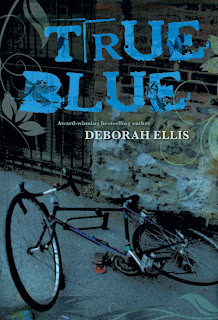Pajama Press
978-0-9869495-0-0
229 pp.
Ages 11-14
2011
Coulda,Shoulda,Woulda.
That could be Jess’ catchphrase, especially when it comes to the choices she makes
with respect to her best friend, Casey White, a.k.a. Praying Mantis: fellow camp counselor at
Ten Willows; budding entomologist; soon-to-be youngest field assistant at
4-month research stint in Australia working with the True Blue beetle; and
alleged murderer.
Jess’ mantra should be revised to Coulda,Shoulda,Woulda,Did because when Casey is arrested for the
murder of eight-year-old camper/bully/thief Stephanie Glass, Jess doesn’t act
like the BBF everyone believes she is.
While Casey sits in jail and continues to write letters to Jess,
affectionately nicknamed Dragonfly, Jess is fighting incessantly with her mom
(whose bipolar disorder has pushed her to manically fight for Casey’s
innocence); latching onto new friends (the popular but insubstantial Amber and
Nathan et al.); waking nightly at 2
a.m. to cycle to the camp and through neighbourhoods of their small town; and making decisions
(always justifiably) that seem contrary to those of a best friend.
The mystery of Stephanie’s death, as well as that of Jess’
inexplicably unsympathetic actions, compels the reader on, but the answers are
not necessarily gratifying. And that’s
because the notion of coulda,shoulda,woulda
is a foible of human nature that cannot be answered with a “because…” It simply allows the reader the chance to
speculate with a “perhaps?” A feel-good
ending will not be read here, but an insightful exposé of one friendship, seen
as true-blue, is open for scrutiny.
Many reviewers speak of True Blue as a departure for Deb
Ellis from her issues-driven books such as The
Breadwinner, Parvana’s Journey,
and I am a Taxi, set in developing
countries. But I see True
Blue as a furtherance of Ellis’ writing into the behaviours of young
people when faced with hardships (whether physical or emotional) in order to
cope or even survive. The choices may
not always be the best, in the eyes of the reader or an adult, but they are adopted
and their consequences endured or embraced.
Ellis has created a real story about young people we may know and given
us much to ponder about choices made. Brilliant.

No comments:
Post a Comment